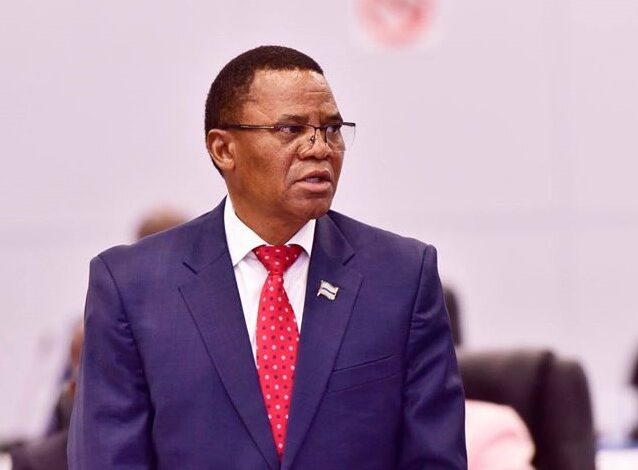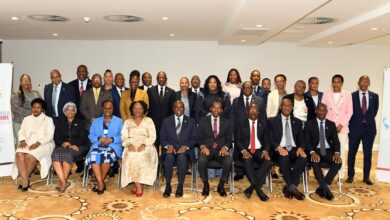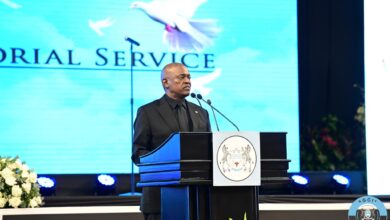MOTION ON THE AFFIRMATION OF EMERGENCY REGULATIONS

MOTION ON THE AFFIRMATION OF EMERGENCY REGULATIONS
1. Under the Emergency Powers Act, the President can make such regulations as appear to him to be necessary or expedient for, amongst others, securing the public safety and the defence of the Republic, the maintenance of public order, and for maintaining supplies and services essential to the life of the people.
2. Such Regulations have been published through Statutory Instrument No. 61 of 2020 and are currently in force. They deal with a wide spectrum of issues including declaration of a national lockdown for the whole of Botswana, effective midnight 02nd April 2020 until 30th April 2020; curtailment of movement by persons with a view to suppressing the virus, etc, whilst allowing the economy to run at a minimal level.
3. During the period of the lockdown all persons employed within the public service, parastatals and state owned entities shall, to the exclusion of essential services personnel, work remotely from home. This also applies to the private sector.
4. During lockdown everyone shall remain confined to their homes except those attending an urgent meeting of Cabinet, the National Assembly, a Council, an urgent meeting of the COVID-19 National Task Team or are essential service employees.
5. All schools shall be closed during the state of public emergency.
6. All religious places of worship shall be closed during the state of public emergency.
7. A person shall not travel between villages, towns, cities and districts for non- essential travel during a lockdown
8. During lockdown a person may leave his/her home between the hours of 0800 and 2000 to access essential supplies, provided he/she is issued with a permit.
9. Persons other than citizens and non-citizen residents are not allowed entry into Botswana during the state of public emergency.
10. To provide the necessary safeguard during the period of lockdown, health services, emergency services, administration of justice, legal practitioners and the media have been declared as essential. However, they should obtain permits to access their workplaces.
11. The escalation of measures to fight the COVID-19 pandemic from the Public Health Act [CAP.63:01] to the Constitution will allow Parliament to provide the necessary oversight role of ensuring that the Emergency Powers Regulations are a product of national consensus.
12. The Public Health Act is a good piece of legislation that attempts to deal with public health emergencies. However, it is limited and is not sufficiently endowed with authority to deal with a public health emergency of this magnitude. For example, section 23 of the Public Health Act authorises the Director to declare that a public health emergency exists. Such declaration is limited to seven (7) days although in terms of section 24 of the Act the Director has authority to “extend the period of a public health emergency declaration as may be necessary.”
13. A resolution made by the National Assembly in terms of section 17 of the Constitution continues in force until the expiration of a period of six months beginning with the date of its being so approved or until such earlier date as may be specified in the resolution.
14. Once the President issues a declaration that a state of public emergency exists, the President is authorised to make regulations under the Emergency Powers Act [CAP. 22:04]. The Emergency Powers Act provides wider latitude compared to the Public Health Act. The Public Health Act requires issuance of directives by the Director while under the Emergency Powers Act, regulations are issued by the President and take precedence where there is inconsistency between the Regulations and existing laws.
15. Emergency regulations issued by the President under the Emergency Powers Act do not suspend the operation of existing laws. The Regulations are read with existing laws and only take precedence where there is inconsistency.
16. The Regulations were further amended through Statutory Instrument No. 62 of 2020. The major amendment include incorporation the definition of the word ‘home’, which includes masimo and moraka. The forms for permits were substituted to facilitate contact tracing of individuals. Further, a new provision was incorporated banning the importation or sale of tobacco during the state of public emergency.
17. Additional amendments were made through Statutory Instrument No. 63 of 2020, which I tabled today. The notable amendment includes giving the Chief Justice powers to suspend certain court procedures such as the timelines laid down in the High Court Rules, issuance of Directives relating to the detention, bail or remand of prisoners awaiting arraignment, trial or appeal.
18. The amendment above also includes suspending section 18 of the Local Government Act, which provides for the filling of the seat of a member of Council within a period of three months.
19. Further Statutory Instrument No. 63 of 2020 incorporates an amendment which prohibits an industrial action during the state of emergency.
20. The above instrument further provides that where a business is unable to have employees work remotely from home or where it is unable to pay salaries, the business may cease operations but that it shall not retrench or dismiss an employee during the state of emergency.
21. This House is requested to approve the Emergency Powers (Covid-19) Regulations, 2020 contained in Statutory Instrument No. 61 of 2020 as amended through Statutory Instruments No. 62 of 2020 and 63 of 2020.





